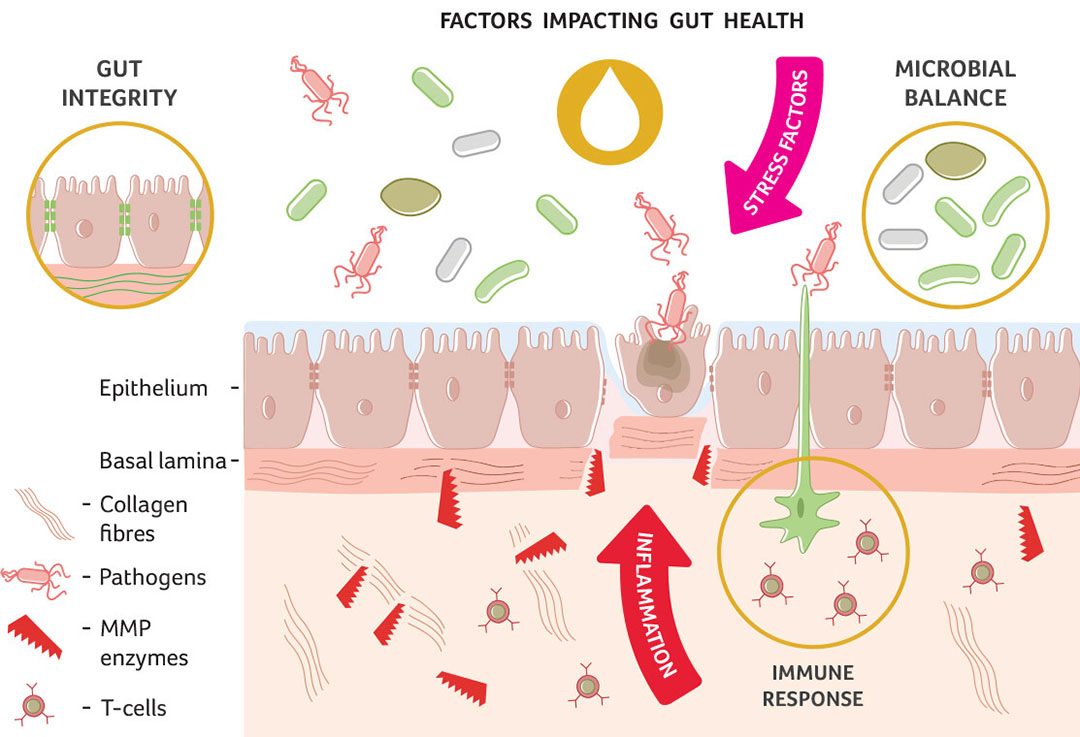How to manage and sustain optimal intestinal health

Over the last few years, more focus has been put on the effects and impact of chronic infections, both in humans and animals. In intensive animal production chronic infections are not unknown, think of PRRSv or Colibacillosis due to E. coli in poultry. A multi-disciplinary approach is needed to control the negative effects of these conditions.
Part of the Gut Health 2022 Special
The best approach for this means that farmers get regular support from value chain partners including veterinarians, feed suppliers, breeders and housing specialists. Within the animal feed value chain, suppliers of raw materials and additives are also collaborating to provide the most effective products to improve animal performance. To achieve this, it is important to focus on the following four interrelated pillars: inflammation status, immune system activity, microbial balance and gut integrity. See image for a schematic overview of the workings of these pillars in the intestinal epithelium.

Inflammation status
Acute inflammation is a short-term defence response to injury and is required for healing and tissue repair. Acute inflammation is characterised by heightened levels of pro-inflammatory cytokines which are balanced by the presence of anti-inflammatory response when the trigger is terminated. Repeated presence of the trigger (e.g. stress, microbial pressure or ammonia) can induce chronic inflammation with persistent levels of pro-inflammatory cytokines. Research has shown that in-feed additives like resin acids can aid in the pro- and anti-inflammatory balance and that a more efficient inflammation response will lead to improved performance of the animal.
Immune system activity
The collective goal of the intensive animal production industry to reduce antimicrobial resistance by lowering the use of antimicrobial growth promotors has sparked pressure to develop preventive measures to combat infections, with vaccines against African Swine Fever (ASF) and Avian Influenza (AI) as latest high-profile methods. There are indications that certain feed additives like alpha-monolaurin can modulate immune activity and even enhance immune response to vaccination. A swifter immune response could result in faster inhibition of a virus in infected animals and maybe even in better protection.
Microbial balance
The term gut microbiota refers to the group of microorganisms that colonise the gastrointestinal tract (GIT). The composition of the microbiome is directly associated with the health of the host. Alterations in compositions of the predominant organisms or dysbiosis are associated with gastrointestinal disorders and disease. The bacterial population in the ileum is highly affected by diet composition and different strategies can be employed to prevent dysbiosis and loss of productivity. Several studies have shown the positive effects middle chain fatty acids (MCFA) on reducing the growth of pathogenic bacteria.
By reducing the number of microbes that feed on the digesta, more nutrients are available for the host and this will lead to improved feed conversion. Since the chain length of the fatty acid determines effectiveness against different types of bacteria, it is possible to target specific bacterial overgrowth and support the health promoting intestinal bacteria.
Gut integrity
Optimal gut health is key to maintaining high levels of digestibility and absorption of nutrients. Besides utilising nutrients from feed, the gut acts as a barrier against antigens, toxins and pathogens. The barrier, or mucosal integrity, can be impaired by many factors of which toxins and inflammatory elements have the strongest impact. Strategies to combat leaky gut can focus on maintaining the basal membrane of the intestinal epithelium or strengthening the integrity of the tight junctions and can be achieved with products like resin acids or tributyrin respectively. This will help with reduced gut inflammation and lesions, less outflux of valuable nutrients and in the end, reduced diarrhoea incidence and improved efficiency.
Taking a proactive stance
Now is the time to switch from a reactive to a proactive stance on inflammation, immunity, imbalance and integrity. To unleash the full potential of your gut health improving components, it is important to select products that complement each other. When all four pillars mentioned above are combined in a single product, the potential of the blend can exceed that of the single components due to the synergetic effect. This is possible with the unique PhytoLipoGenics concept.
The collaboration between Marvesa and Denkavit with Hankkija’s Progres has additional advantages. The natural liquid resin acids are combined with the liquid functional fat products from Marvesa, such as Lecifeed and PLG.
The combination of products has a broader effect and offers an effective tool to manage intestinal health.
References available upon request.






